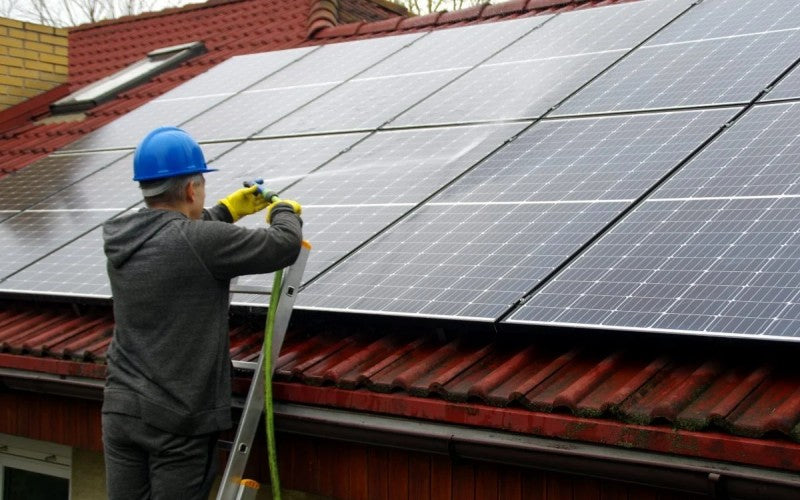
As the demand for clean and renewable energy continues to rise, many homeowners are considering the installation of solar panels to power their homes. Solar panels offer a sustainable and cost-effective solution to reduce reliance on traditional energy sources. However, before taking the plunge into solar energy, it is essential to ask the right questions to ensure a smooth and successful transition. In this article, we will explore seven crucial questions to ask before getting solar panels, providing you with the necessary insights to make an informed decision.
1. Can Your Roof Support a Solar Panel System?
Before installing solar panels, it is vital to assess whether your roof can accommodate them effectively. Factors such as the age, condition, and orientation of your roof will influence the feasibility of a solar panel installation. Ideally, your roof should have a sturdy structure, free from any signs of damage or deterioration. Additionally, the angle and orientation of the roof should allow for optimal sun exposure throughout the day. Consulting with a professional solar installer will help determine if your roof is suitable for solar panel installation.
2. Do You Need a License for Solar Panel Installation?
Depending on your location, you may need a permit or license to install solar panels on your property. Local regulations and building codes can vary, so it is crucial to inquire about the necessary permits beforehand. Working with a reputable solar installation company will help ensure compliance with all legal requirements and expedite the permitting process.
3. Do You Need Solar Backup?
Solar panels generate electricity when exposed to sunlight, but they do not provide power during cloudy days or at night. If you desire uninterrupted power supply, it is worth considering a solar backup system, such as a battery storage solution. A solar backup system allows you to store excess energy generated during the day for use during times of low or no sunlight. This ensures a continuous power supply and can potentially save you money by reducing reliance on the grid.
4. How Long Will the Solar Panel Last, and What is the Warranty?
Solar panels are a long-term investment, and it is essential to understand their lifespan and warranty coverage. On average, solar panels can last 25 to 30 years or more, with minimal degradation in performance over time. When selecting solar panels, inquire about the manufacturer's warranty, which typically covers defects and guarantees performance for a specified period. A reputable solar installer will provide detailed information about the expected lifespan of the panels and the warranty terms.
5. How Many Solar Panels Do You Need?
Determining the number of solar panels required to meet your energy needs is a crucial step in the planning process. Factors such as your average energy consumption, roof size, and available sunlight should be considered. A professional solar installer can assess your energy usage patterns and conduct a site survey to determine the optimal number of solar panels to achieve your desired energy output. By accurately sizing your system, you can maximize the benefits of solar energy and potentially offset a significant portion of your electricity bills.
6. How Much Can You Save With Solar Power?
Solar power offers substantial financial benefits, including potential savings on your electricity bills. Before investing in solar panels, it is wise to estimate the potential savings based on your energy consumption and local electricity rates. A reputable solar installer can help you calculate the payback period and return on investment (ROI) for your solar panel system. Additionally, inquire about any available government incentives, such as tax credits or rebates, which can further enhance your savings.
7. How Often Do Solar Panels Need to be Cleaned?
Regular maintenance and cleaning are essential to ensure optimal performance and longevity of your solar panel system. The frequency of cleaning depends on various factors, including your location, weather conditions, and the tilt angle of the panels. In general, solar panels require cleaning every 6 to 12 months to remove dirt, dust, and debris that can hinder sunlight absorption. Some solar panels have self-cleaning capabilities, while others may require professional cleaning services. It is advisable to discuss the maintenance requirements with your solar installer and develop a maintenance plan to keep your panels operating efficiently.
Conclusion
Installing solar panels is a significant decision that can bring long-term benefits to both the environment and your finances. By asking the right questions before making a purchase, you can ensure a smooth installation process and maximize the benefits of solar power. Consider factors such as roof suitability, permits, the need for backup systems, panel lifespan and warranty, system sizing, potential savings, and maintenance requirements. Armed with this knowledge, you will be well-prepared to embark on your solar energy journey and contribute to a cleaner, more sustainable future.


0 comments